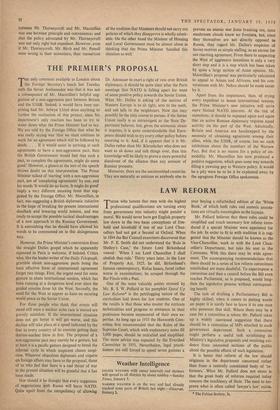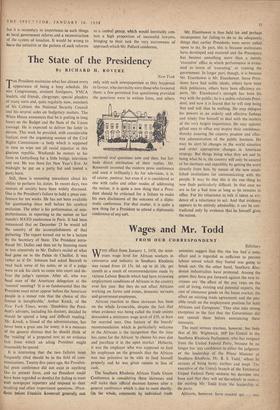LAW REFORM
THOSE who lament that men with the highest professional qualifications are turning away from government into industry might ponder a moral. We would never have got English property law down to the two basic conceptions of free- hold and leasehold if one of our Lord Chan- cellors had not got a Second at Oxford. When in 1894 the Bar Council examiners discovered that Mr. F. E. Smith did not understand the 'Rule in Shelley's Case,' the future Lord Birkenhead vowed : 'When I am Lord Chancellor I shall abolish that rule.' Thirty years later, in the Law of Property Act, 1925, he did. Birkenhead's famous contemporary, Rufus Isaacs, fared rather worse in examinations; he scraped through the Bar Finals with a Pass.
One of the most valuable points stressed by Mr. R. S. W. Pollard in his pamphlet Speed Up Law Reform* is the pettifogging nature of the curriculum laid down for law students. One of the results is that those who master the intricate technicalities and progress to eminence in their profession become enamoured of their own ex- pertise. As long ago as 1935 the Hanworth Com- mittee first recommended that the Rules of the Supreme Court, which with explanatory notes fill 3,000 pages, should be redrafted and simplified. The same advice was repeated by the Evershed Committee in 1951. Nevertheless, legal practi- tioners are still forced to spend seven guineas a year buying a refurbished edition of the 'White Book,' of which both rules and esoteric annota- tions are virtually meaningless to the layman.
Mr. Pollard believes that these rules could be simplified and much necessary law reform intro- duced if a special Minister were appointed for the job. In order to fit in with tradition it is sug- gested that the Minister should be known as the Vice-Chancellor, work in with the Lord Chan- cellor's Department, but take his seat in the Commons. With this there may be wide agree- ment. The accompanying recommendations that there should be a series of law reform committees established are more doubtful. To superimpose a committee and then a council before the Bill even reaches Parliament, as is proposed, would leng- then the legislative process without correspond- ing benefit.
The task of drafting a Parliamentary Bill is highly skilled; when it comes to putting words on paper it is surely best to leave it to one man who possesses that skill. Where there may be a case for a committee is where Mr. Pollard takes up a widely canvassed suggestion that there should be a committee of MPs attached to each government department. Such a committee might perform a useful task scrutinising its Ministry's legislative proposals and receiving evi- dence from interested sections of the public about the possible effects of such legislation.
It is better that reform of the law should originate in the department concerned rather than from a centrally constituted body of 're- formers.' What Mr. Pollard does not stress is that the great body of reforms required today concern the machinery of State. The need to im- prove what is often called 'lawyer's law' exists, * The Fabian Society, 3s. but it is secondary in importance to such things as local government reform and a reconstruction of the system of taxation. It would be wrong to leave the initiative or the pattern of such reforms to a Central group, which would inevitably con- tain a high proportion of successful lawyers, bringing to their task the very narrowness of approach which Mr. Pollard condemns.



































 Previous page
Previous page